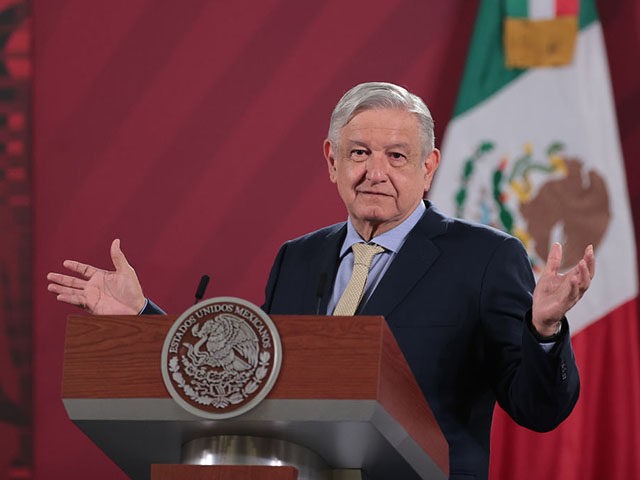The Mexican Senate passed a reform on Wednesday that greatly reduces the powers and significantly slashes the budget of the National Electoral Institute (INE), Mexico’s independent election oversight committee.
The reform was spearheaded by far-left President Andrés Manuel López Obrador, who has repeatedly attacked the Institute, claiming that it endorsed voter fraud in Mexico’s 2006 and 2012 presidential elections. López Obrador lost those elections but dramatically, and incorrectly, declared himself the “legitimate president” of Mexico in 2006, anyway.
López Obrador won the 2018 presidential election with 54.71 percent of the votes and, unlike the others, did not contest the results of that election.
The National Electoral Institute, founded in 1990, is responsible for organizing and overseeing federal elections in Mexico, as well as being in charge of issuing voter identification cards to the Mexican electorate. INE is greatly attributed to have been instrumental in ending the 71-year one-party dictatorship of Mexico’s left-wing Institutional Revolutionary Party (PRI) and establishing democracy in Mexico in 2000.
The approved reform, which still needs to be signed into law by López Obrador, will see sweeping changes in the Institute’s structure, the elimination of essential powers of the institute, and a drastic cut in its budget, forcing it to reduce its workforce and shut down regional offices throughout Mexico.
The reduction in budget, according to INE, would translate into an 85-percent cut in professional electoral service personnel, who perform essential election-related tasks such as administering the electoral roll, organizing and training citizen observers at the polling places, and counting the votes. Detractors of the reform claim that the soon-to-be law contains provisions that diminish INE’s ability to sanction those who fail to comply with electoral regulations.
The reform approved by the Mexican senate is known as “Plan B” among the Mexican Senate, as it omits a controversial “eternal life” clause that would have allowed the transfer of votes between parties of the same coalition. The controversial clause was promoted by the Mexican Green and Labor parties, allies of López Obrador’s National Regeneration Movement (MORENA) party, which currently controls the nation’s government. The reform was passed with 72 votes in favor and 50 votes against.
The changes will immediately affect the upcoming June local elections in Coahuila and the State of Mexico, as well as the 2024 presidential election.
Lorenzo Córdova, head of the INE, condemned the changes as a “democratic setback” that put at risk “certain, trustworthy and transparent” elections. Córdova’s term as head of the National Electoral Institute is slated to end on April 3.
Mexico’s Electoral Tribunal of the Federal Judiciary recently ruled that a woman must be in charge of the INE in the name of gender equality — a decision that López Obrador said would command for the electoral institution, as women ” tend to be more honest,” according to him.
The reform of the National Electoral Institute follows years of recurrent attacks and accusations by López Obrador against the institution, which he claims robbed him of a victory in the 2006 and 2012 presidential elections.
In 2020, López Obrador accused the INE of being the “most expensive election organization apparatus in the world,” claiming that the Institution does not guarantee fair elections.
“We triumphed [in 2018], because it was impossible to make a fraud, but in the previous elections, it [the INE] allowed it,” López Obrador claimed at the time. “One day we will present the structure of INE and what it costs. We will seek to readjust the structures, so that there are no duplicities.”
The Mexican Senate claims that the reform will transform the nation’s electoral system to make it “closer to the citizens” and “more transparent.”
During the debate on the bill, several Mexican senators expressed their rejection and criticism of the reform on behalf of their respective political parties.
Senator Indira de Jesús Rosales San Román of the National Action Party expressed that the reform is full of “rancor and hatred,” adding that the bottom line is to “weaken and destroy” the electoral arbiter.
“López Obrador’s regressive, toxic, perverted, anti-democratic reform is coming from the top down,” Dante Delgado, leader of the opposition Movimiento Ciudadano party said. “He is destroying the work and fight of millions of Mexicans to create a democratic, impartial system.”
The Mexican opposition announced that it will ask the nation’s Supreme Court to annul the legislation on the basis that the Mexican government did not submit the reform to the two-thirds vote needed to be approved as per the Mexican constitution demands.
The Mexican opposition also called to protest against the reform and in defense of the INE this upcoming Sunday. López Obrador preemptively accused would-be protesters of being “in favor of corruption” during a press conference held on Wednesday.
“It is important that people know what they are coming for because they have every right. If they are convinced that the corruption regime was right, let them come, it is their right, it is a kind of masochism,” he proclaimed.
In November 2022, Mexicans took the streets to peacefully protest López Obrador’s then-proposed electoral reforms, with the far-left president criticizing the protesters, claiming they had protested in favor of “corruption, racism, classism, and discrimination.”
Christian K. Caruzo is a Venezuelan writer and documents life under socialism. You can follow him on Twitter here.

COMMENTS
Please let us know if you're having issues with commenting.